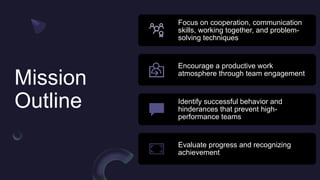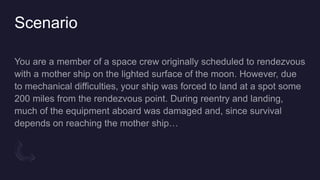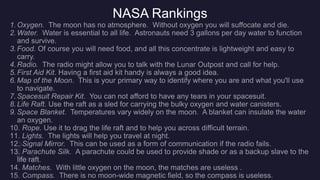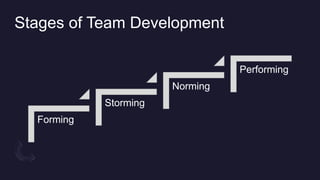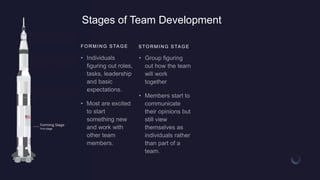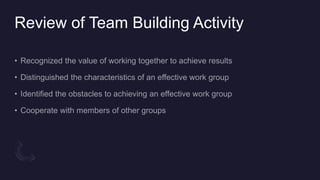Stranded on the Moon - Team Engagement Activity.pptx
- 3. Mission Outline Focus on cooperation, communication skills, working together, and problem- solving techniques Encourage a productive work atmosphere through team engagement Identify successful behavior and hinderances that prevent high- performance teams Evaluate progress and recognizing achievement
- 4. Scenario
- 6. Items left intact and undamaged after landing ŌĆó Box of Matches ŌĆó Space Blanket ŌĆó Magnetic compass ŌĆó Food Concentrate ŌĆó Spacesuit repair kit ŌĆó 20 liters of water ŌĆó 50 feet of Nylon rope ŌĆó Two 100 lb. Tanks of oxygen ŌĆó Signal mirror ŌĆó Parachute silk ŌĆó Map of the Moon ŌĆó Self-inflating life raft ŌĆó Two Flashlights ŌĆó First aid kit, including injection needle ŌĆó Solar powered radio - FM receiver-transmitter
- 8. Mission-launch Crew MOON-RISERS CREW SUN-SETTERS CREW
- 9. Items left intact and undamaged after landing ŌĆó Box of Matches ŌĆó Space Blanket ŌĆó Magnetic compass ŌĆó Food Concentrate ŌĆó Spacesuit repair kit ŌĆó 20 liters of water ŌĆó 50 feet of Nylon rope ŌĆó Two 100 lb. Tanks of oxygen ŌĆó Signal mirror ŌĆó Parachute silk ŌĆó Map of the Moon ŌĆó Self-inflating life raft ŌĆó Two Flashlights ŌĆó First aid kit, including injection needle ŌĆó Solar powered radio - FM receiver-transmitter
- 10. NASA Rankings
- 11. Mission Debrief
- 12. Stages of Team Development Forming Storming Norming Performing
- 13. Stages of Team Development FORMING STAGE
- 14. Stages of Team Development STORMING STAGE FORMING STAGE
- 15. Troublesome Teammates SOCIAL -LOAFER SHERRI SOCIAL -CLIMBER CARRIE CONTRARIAN CHUCK MONOPOLIZER MIKE You know this guy! Blah., blah, blah ThereŌĆÖs a lot of rewording, restating, revisiting of what has already said but contributes nothing but frustration. YouŌĆÖve meet her. Never contributes anything to achieving results but ready to give you an earful if it doesnŌĆÖt turn out right. You know her. Always looking in the corporate mirror, working that personal agenda and look for the next rung. Your familiar with him. Never contributes anything to achieving results but ready to give you an earful if it doesnŌĆÖt turn out right.
- 16. Stages of Team Development STORMING STAGE NORMING STAGE FORMING STAGE
- 17. Stages of Team Development STORMING STAGE NORMING STAGE PERFORMING STAGE FORMING STAGE
- 18. Review of Team Building Activity
Editor's Notes
- #2: ║▌║▌▀Ż Show Notes Today weŌĆÖre going to talk about team engagement. Teams can be an extremely effective way to make the best use of your diverse skills, knowledge, backgrounds, and approaches to work. A high-performance teams can boost productivity, improve quality, and increase your motivation and job satisfaction. We can use teams for everything from handling projects, to solving problems, to dealing with ongoing tasks.
- #3: Speaker Notes The objective of this session is to build a more effective work group. At the end of this session you will be able to: Recognize the value of working together, collaborating with each other, and the importance of cooperation. Distinguish the characteristics of an effective team. Identify what gets in the way of being an effective and efficient team. And too walk away with a personal commitment to cooperating with members of other groups At the end of this session, youŌĆÖll recognize that a┬Āteam┬Āis a┬Āgroup┬Āof people who share a common┬Āpurpose and several challenging goals. And, if you didnŌĆÖt realize it of not, you're on a team.
- #4: Speaker Notes The ultimate purpose of this team engagement activity is to focus on commitment, cooperation, communication skills, the ability to working together, and to apply problem-solving techniques between two disparate groups ŌĆō Business Support and Agency Sales. Encourage a productive work atmosphere through team engagement. Not to say, that it is an unproductive work atmosphere, the intention is to make it better ŌĆō there is always room for improvement Identify successful behavior and hinderances that prevent an effective work group. Evaluate the progress and recognizing achievement Feel free to ask questions during the presentation if anything is unclear or needs further explanation.
- #5: Speaker Notes Read the following to participants You are a member of a space crew originally scheduled to rendezvous with a mother ship on the lighted surface of the moon. However, due to mechanical difficulties, your ship was forced to land at a spot some 200 miles from the rendezvous point. During reentry and landing, much of the equipment aboard was damaged and, since survival depends on reaching the mother shipŌĆ”
- #6: Speaker Notes Read the following to participants The most critical items available must be chosen for the 200-mile trip. On the next screen are listed the 15 items left intact and undamaged after landing. Your task is to rank order them in terms of their importance for your crew which will allow them to reach the rendezvous point. Each team will need to decide by recording the number 1 by the most important item, the number 2 by the second most important, and so on through number 15 for the least important.
- #7: Speaker Notes Here are the 15 items. (randomly name a few items and then mention) What are the most essential items for the survival for the crew on the moon and youŌĆÖll need to work as a team to come to a consensus about the importance of these survival items. DonŌĆÖt worry, these items will be displayed throughout the entirety of your activity. But first, letŌĆÖs discuss your Mission Directives.
- #8: Speaker Notes We have randomly divided all crew members into two groups: Moon-risers and Sun-setters We will provide you with a link to your private team room where you can work on your team activity. Once in their groups, members need to select a scribe. Someone who will write down the consensus of the teamŌĆÖs rank-ordered items. Each team will have 30 minutes to rank-order the items from most important to least important and provide a rational for each item. Some suggestions on how to complete this task; May be to discuss each item as a group and form a consensus as to each itemŌĆÖs ranking, or you could have each team member independently rank order the items and then based on everyoneŌĆÖs ranking you can form a consensus. However, its completely up to each team as to how they will to problem solve this. As facilitators, we will present but video and audio will be off, so you can collaborate on the task on your own. However, if you really need us. We will be within earshot. At the end of 30 minute we will come back. At the end of 30 minutes all each team will have a complete ranked-ordered list. Upon completion, we will compare your teamŌĆÖs rankings to the NASAŌĆÖs expert rankings. The activity is pseudo-competitive, where the team with the lowest differential-score (the difference between the team score and NASAŌĆÖs score) will most likely survive a crash landing on the moon. At the end of the session we will review and discuss the achievements during this exercise. So keep in mind, throughout the process, that you should be mindful of otherŌĆÖs and your behavior, hinderances, and results of the exercise.
- #9: Speaker Notes Here are the two teams to which you belong. The Moon-risers Crew: Jay, Karen, Katie, Doreen, and Demar The Sun-Setter Crew: Hannie, Asklee, Joe, Dena, Jonathan Moon-risers: https://www.gotomeet.me/SteveYudewitz/moon-riser-team Sunsetters: Stay right here this will be your team room.
- #10: Speaker Notes Here are the 15 items. (randomly name a few items and then mention) What are the most essential items for the survival for the crew on the moon YouŌĆÖll need to work as a team to come to a consensus about the importance of these survival items. You need to select a scribe. Someone who will write down the consensus of the teamŌĆÖs rank-ordered items. At this point, I will not be visible, and nor will I interrupt your process, However, if you really need me to answer a question, I will be within earshot. At the end of 30 minutes the team will have a completed ranked-ordered list.
- #11: Speaker Notes Here is NASAŌĆÖs official answer key: Oxygen. The moon has no atmosphere. Without oxygen you will suffocate and die. Water. Water is essential to all life. Astronauts need 3 gallons per day water to function and survive. Food. Of course you will need food, and all this concentrate is lightweight and easy to carry. Radio. The radio might allow you to talk with the Lunar Outpost and call for help. First Aid Kit. Having a first aid kit handy is always a good idea. Map of the Moon. This is your primary way to identify where you are and what you'll use to navigate. Spacesuit Repair Kit. You cannot afford to have any tears in your spacesuit. Life Raft. Use the raft as a sled for carrying the bulky oxygen and water canisters. Space Blanket. Temperatures vary widely on the moon. A blanket can insulate the water an oxygen. Rope. Use it to drag the life raft and to help you across difficult terrain. Lights. The lights will help you travel at night. Signal Mirror. This can be used as a form of communication if the radio fails. Parachute Silk. A parachute could be used to provide shade or as a backup slave to the life raft. Matches. With little oxygen on the moon, the matches are useless . Compass. There is no moon-wide magnetic field, so the compass is useless.
- #12: Speaker Notes This is an open conversation ŌĆō everyone should contribute. Not all at once. What I would like you to focus on is not just what overtly happen in your team dynamic. But what happened underneath, was there eagerness on your part? personal frustration? Generosity? Envy? Upset? Learning about each other Did you notice if everyone was excited to start the activity? Or, apprehension? Individuals are often apprehensive when thrown together into a group; however, we give the appearance to be optimistic. Who was gung-ho? Already knew most of things that were most important? Was everyone polite and pleasant when starting the activity? Most are excited to start something new, others are nervous about sharing their thoughts and opinions out of fear others will judge them. Challenging each other Did you notice if a leader emerged in the group? Or, was it free-through? Did you notice if anyone was vying for a position? Did you notice any clash of personalities? Did everyone contribute to the activity? Was everyone able to input thoughts? Or, did you notice certain peopleŌĆÖs opinions carried more weight than others? Was there any conflict in the group? Where there any over-contributors? Without calling anyone out by name, did you notice if there was anyone who was monopolizing conversation? kind-of taking over? Where there any under-contributors? That is, where there any social-loafers? Hanging out in the background, not really contributing. Working with each other Did you notice if the team settled into a groove? Working as one Did you notice by the end of the activity if you were a cohesive group? Meaning ŌĆō everyone was on the same page ŌĆō driving full speed ahead. Would you select the same teammates for another survival mission?
- #13: Speaker Notes This is the Ah-ha portion of the training. Where for us, it all comes together. The previous debrief was meant to highlight some of the easy processes and potential challenges to working on a team. Some of you may say, HEY putting us together for an hour is not the same as working with each other on a daily basis. Well, actually it is. The experts say that all teams no matter how large or small | for a short period or on a daily basis | all having go through the Stages of Team Development. Forming ŌĆō Storming - Norming ŌĆō Performing Stages of Team Development This gives us an opportunity to look at what these stages are, why are they important, and in the future, when your part of a team - you can expect that your team will go through these stages of development. Sometimes quickly sometimes slowly, some teams may get stuck in certain stages. But importantly if you want to be a high-performance team | you must go through all the stages. And even more interesting, when a new member comes onboard, regardless if you are already a high functioning team | the team must go through all these stages again - Sometime quickly ,sometimes slowly, sometimes getting stuck. Ok let take a look at these stages.
- #14: Speaker Notes FORMING - The first stage of team development is forming, which is a lot like orientation day at a PeopleŌĆÖs Trust. You could even compare it to going out on a first date. Always on your best behavior. Generally, when at team is newly formed and everyone has just been introduced, everyone tends to be overly polite and pleasant. Most are excited to start something newŌĆ”..and to get to know the other team members. At this stage, team members are afraid or do not like to ask others for help. As the group starts to familiarize themselves within the team | roles and responsibilities will begin to form. Did anyone see this happening in their team formation? EveryoneŌĆÖs polite and your trying to figure out what you can say - and when to refrain from speaking? It is important for team members to develop relationships Newly formed teams should participate in ice-breakers in order to develop relationships. Like- each member share their greatest achievement or tell me that one thing no one would ever know about me scenario. But, because this stage focuses more on the people than on the work, your team probably wonŌĆÖt be very productive yet.
- #15: Speaker Notes STORMING ŌĆō This is my most favorite stage to talk about because when youŌĆÖre aware that this stage happens ŌĆō itŌĆÖs the most obvious stage. During the storming stage you might say to your self. ŌĆ£I donŌĆÖt know if I can work in this environment?ŌĆØ ŌĆ£Maybe this job isnŌĆÖt for me?ŌĆØ Going back to our relationship analogy, have you ever reached the point in a relationship where you become aware of a personŌĆÖs characteristics and they frustrate or annoy you? Perhaps they squeeze the toothpaste from the top of the tube instead of the bottom? Eat with their mouth open? Or they listen to the same Drake song 15 times in a row? Well, congrats, youŌĆÖve entered the storming stage. Being in a team is like being in a relationship. At first, you may think someone is perfect and flawless. But, then you realize that they arenŌĆÖt. Once youŌĆÖre aware of their flaws, you either learn to embrace them or the relationship will end quickly. I shouldnŌĆÖt have to ask ŌĆō everyoneŌĆÖs been there right? In the storming stage, the reality and weight of completing the task at hand has now hit everyone. The initial feelings of excitement and the need to be polite have likely worn off. Personalities may clash. Members might disagree over how to complete a task Or, voice concerns that someone isnŌĆÖt pulling their weight. They may even question the authority or guidance of the team leader. But, it is important to remember that this is normal. This is a stage - most teams experience conflict. *Some teams try to skip over the storming stage or avoid conflict at whatever cost. Avoidance usually makes the problem grow until it blows up. So, recognize conflicts and resolve them early on. There are certain character types that usually appear on a team, letŌĆÖs discuss them. .
- #16: Speaker Notes Monopolizer Mike ŌĆō You know this guy! Blah., blah, blah ThereŌĆÖs a lot of rewording, restating, revisiting of what has already said but contributes nothing but frustration. This guy, once he gets stuck on something- like his point of view - he doesnŌĆÖt quit The Social-Loafer ŌĆō YouŌĆÖve meet her. Never contributes anything to achieving results but ready to give you an earful if it doesnŌĆÖt turn out right. In my experience this is the most troublesome teammate. They hide below the radarŌĆ”never really contributing much to a project (and when they do its either last minute or late and anyway inadequate.). Once theyŌĆÖre found, the wrath of resentment is profound. This is where conflict-management really needs to be implemented. This is why we call this the storming stage. Social-Climber Carrie - You know her. Always looking in the corporate mirror, working that personal agenda and look for the next rung. Try┬Āto convince you of how awesome and inspirational┬Āthey are | while detracting from team cohesion Contrarian Chuck ŌĆō Your familiar with him. Just when your driving ahead and achieving result this guy drops it into 3rd gear and points out all the flaws. Never contributes anything to achieving results but chaos. Usually, having a contrarian view is a good critical thinking skill; however, if unchecked, their negativity can undermine innovation and morale.
- #17: Speaker Notes NORMING - During the norming stage, we start to notice and appreciate our team membersŌĆÖ strengths. Groups start to settle into a groove. Everyone is contributing and working as a cohesive unit. Of course, you may still think that your teammateŌĆÖs choice in music is obnoxious. But you also admire their knowledge of the claims process | or differences between HO-3 and Basic Choice, | and value their opinions on anything Insurance related. Everyone becomes a ŌĆ£go-toŌĆØ person for some thing or some reason. Storming sometimes overlaps with norming. As new tasks arise, groups may still experience a few conflicts. If youŌĆÖve already dealt with disagreement before, it will probably be easier to address this time. .
- #18: Speaker Notes PERFORMING - If youŌĆÖve reached the fourth stage, pat yourself on the back. YouŌĆÖre on your way to success. Let me reiterate, you cannot get here without get through the other stages first. In the performing stage, members are confident, motivated and familiar enough with their team that they can operate without supervision. Everyone is on the same page and driving full-speed ahead towards the final goal. YouŌĆÖre in-sync The fourth stage is the one that all groups strive to reach. Yet, some do not make it. They usually fail to overcome conflict and canŌĆÖt work together. But when they do - the experience is wonderful. You recognize that this is the team model that you will use for your entire career. Just out of curiosity, has anyone been on a team like this? .
- #19: Speaker Notes Our concluding thoughts are ŌĆ”The objective of this session was to build a more effective work group. Recognized the value of working together, collaborating with each other, and the importance of cooperation. Distinguished the characteristics of an effective team. Identified what gets in the way of being an effective and efficient team. Understanding that a personal commitment to cooperating with members of other groups is essential to a high-performance team. And if you didnŌĆÖt already realize it, you are already on a team with others who share a common┬Āpurpose



